Joe McDonnell, 400 pounds lighter, all but disappears from sports-talk radio
He was the biggest man in town.
Joe McDonnell always got the scoop, whether it was Pat Riley being fired or Wayne Gretzky being traded, Magic Johnsonâs comeback or Mike Sciosciaâs contract, no secret too deep, no detail too obscure.
Athletes loved him. Sources trusted him. Fans followed him. Nobody beat him.
He was the biggest man in town.
Joe McDonnell weighed 740 pounds. That is not a misprint. Visiting players would gasp. Insensitive fans would jeer. Everywhere he lumbered, somebody would stare.
He was so big, local teams gave him a special chair without arms so he could sit at their press tables and eat in their press rooms. He was so big, his size eventually became part of his name.
Big Joe. The Big Nasty. For nearly two decades beginning in the early 1980s, the radio personality eclipsed the Los Angeles sports-talk radio scene with his information, insight and indomitable presence.
âHe was as tapped into the Los Angeles sports scene as much as anyone Iâve ever seen, in any market, ever,â says Erik Braverman, one of his former sports-talk radio bosses here. âHe epitomized the Los Angeles sports fan.â
Big frame, big fame, big paradox.
As McDonnellâs ratings expanded, so did his waistline. As his success was giving him life, his weight was slowly killing him. His star brightened as his health dimmed.
He was thriving in public, and dying inside.
âProfessionally, it was great,â he says today. âPersonally, not so great.â
He was faced with an unfair choice, but he was faced with no choice. Six years ago, McDonnell underwent gastric bypass surgery to lose the weight even though he risked also losing the image that fueled a career.
âIt was like, if you donât have surgery, you are going to die,â McDonnell recalls today. âI had to make a change.â
Today that change is massive, and mystifying.
McDonnell is 298 pounds, healthy, and muzzled. He looks great, but he sounds empty as he talks about a radio career that is currently as ill-fitting as his clothes.
He has not been host of a Los Angeles sports-talk show for two years. He has not been host of any sort of sports-talk show for nearly a year. He works two or three days a week as the sports update guy on KNX 1070, and still breaks stories there, but having him in that position is like having a master chef working the hostess stand.
âSuddenly, heâs been silenced, and itâs just ridiculous,â says Doug Krikorian, the respected Long Beach Press-Telegram sports columnist and Big Joeâs former partner on the McDonnell-Douglas sports-talk show. âItâs a great injustice, and I canât figure it out.â
McDonnell shrugs. Weâre having lunch in a downtown restaurant where he easily slid into a booth. Heâs eaten five bites of a hamburger with no bun. He feels good, but he wonders what happened. He wonders whether people think that he lost more than the pounds. He wonders whether they think he also lost the passion fueled by those pounds.
âIf people think that, theyâre wrong,â he says. âNow that Iâm healthy, Iâm everything I used to be, only better and stronger.â
And man, this guy was good.
On one of my first days covering Los Angeles sports as the Dodgers beat writer in 1989, I walked into the clubhouse and saw two things that made me freeze with amazement.
There was this enormous human being standing in the corner. And he was having an exclusive interview with the unapproachable Kirk Gibson.
That was Big Joe. He was my electronic media idol. He worked a room like no electronic guys work rooms. He would then take all of his inside information and shout it across Los Angeles like a radio version of the best and juiciest sports blog. Seemingly every athlete not only knew him, but trusted him.
He spent Game 3 of the 1977 World Series hanging out in the Dodger Stadium clubhouse after fans spilled beer on his shirt and the Dodgersâ clubhouse workers insisted on drying it. He was once allowed into a closed Lakers locker room by Magic Johnson because he wanted McDonnell to interview him. Everybody wanted to hang with the big guy.
âThe weight was a health concern, but in terms of being recognizable, it was part of who he was,â Braverman said. âIt was one of the reasons the players knew him so well. He was a recognizable guy who would always show up, and he was a real character.â
The weight was delightful anger. The weight was humorous sarcasm. The weight was also constant, dangerous eating.
McDonnell would eat postgame meals at midnight, stay up all night hanging out with friends, then finish the gabfest with a full breakfast. He would order four giant hamburgers during stops at fast-food restaurants. He ate constantly through his radio show, sending interns to buy him sweets during commercial breaks when he became too fat to have the energy to do it himself.
He finally reached a breaking point in the summer of 2004 when, during the opener of the NBA Finals, he fell in his bedroom and could not get up. He summoned longtime associate and friend David Vassegh from the game. Vassegh couldnât lift him. The fire department had to be summoned.
âThat was when I finally said, enough,â McDonnell said.
He has since been changed by the surgery, by marriage to Elizabeth, by another death scare over the summer when he was infected by flesh-eating bacteria, and now by the sheer amazement of it all.
He wonders, do people really think that Big Joe was a name that referred only to his girth? Can regaining your health really mean losing your career?
If thatâs the deal, the reborn Joe McDonnell will accept it.
Well, not really.
âIâve had a good run, but itâs not over,â he says, his voice suddenly rising, 400 pounds lighter but still booming, sounding again like the biggest man in town. âItâs not anywhere near over.â
twitter.com/billplaschke
More to Read
Go beyond the scoreboard
Get the latest on L.A.'s teams in the daily Sports Report newsletter.
You may occasionally receive promotional content from the Los Angeles Times.











